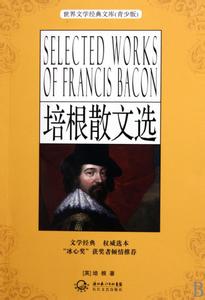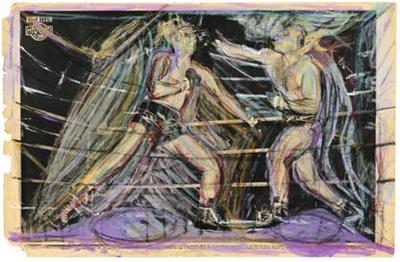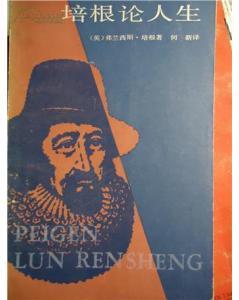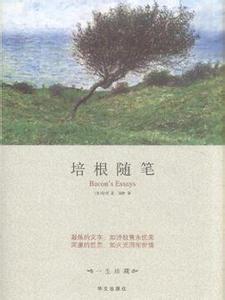弗朗西斯·培根是英国文艺复兴时期最重要的散文家、哲学家。他不但在文学、哲学上多有建树,在自然科学领域里,也取得了重大成就。他的第一部重要著作《随笔》最初发表于1597年,以后又逐年增补。该书文笔言简意赅、智睿夺目,它包含许多洞察秋毫的经验之谈,其中不仅论及政治而且还探讨许多人生哲理。下面小编为大家带来培根经典散文双语阅读,希望大家喜欢!
培根经典散文双语阅读:论变更As the births of living creatures, at first, are ill shapen: so are all innovations, which are the births of time. Yet notwithstanding, as those that first bring honour into their family, are commonly more worthy, than most that succeed: so the first precedent (if it be good) is seldom attained by mutation.
一切生物底幼儿在最初的时候都不好看,一切的变更也是如此,变更者时间之幼儿也。虽如此,有如初创家业者总比后嗣为强,最初的先例(如果是好的)也是不常易以模仿及之的。
For ill, to man's nature, as it stands perverted, hath a natural motion, strongest in continuance: but good, as a forced motion, strongest at first Surely every medicine is an innovation; and he that will not apply new remedies, must expect new evils: for time is the greatest innovator: and if time, of course, alter things to the worse, and wisdom and counsel shall not alter them to the better, what shall be the end? It is true, that what is settled by custom, though it be not good, yet at least it is fit And those things, which have long gone together, are as it were confederate within themselves: whereas new things piece not so well; but though they help by their utility, yet they trouble by their inconformity. Besides, they are like strangers; more admired, and less favoured.
因为在尚未归正的人心上,“恶”是有一种自然的动力的,这种动力在继续中最强;而“善”所有的却是一种勉强的动力,那动力是在起始时最强的。每一种药无疑地都是一种新创之事;不愿用新药的人就得预备着害新病;盖时间乃是最大的革新家也。并且,假如时间会自然地使事物颓败,而智谋与言论又不能使其改良,其结局将不堪设想了。
All this is true, if time stood still; which contrariwise moveth so round, that a froward retention of custom is as turbulent a thing as an innovation:and they that reverence too much old times, are but a scorn to the new. It were good therefore, that men in their innovations, would follow the example of time itself; which indeed innovated greatly, but quietly, and by degrees, scarce to be perceived: for otherwise, whatsoever is new, is unlocked for; and ever it mends some, and pairs other: and he that is holpen, takes it for a fortune, and thanks the time; and he that is hurt, for a wrong, and imputeth it to the author. It is good also, not to try experiments in states, except me necessity be urgent, or the utility evident: and well to beware, that it be the reformation, that draweth on the change; and not the desire of change, that pretendeth the reformation. And lastly, that the novelty, though it be not rejected, yet be held for a suspect: and, as the scripture saith; that we make a stand upon the ancient way, and then look about us, and discover what is the straight and right way, and so to walk in it.
习俗之所立,虽不优良,不失为适合时世,这是真的;又长期并行的举动好象是互有关连的,而新的事物则与旧者不甚契合;它们虽有用,可是因为与旧的事物不融洽,所以会引起纠纷。再者,新的事物好象异邦人,很受人艳羡,可是不大得人欢心。这些话当然都对,假如时间是停留不动的;可是时间是动转不停的,所以,固执旧习,其足以致乱与革新之举无异;而过于尊崇古昔者将为今世所僇笑也。因此,人们在更革之中最好能学时间底榜样。时间确常大事更革,但是它是以安详出之的,并且其来也渐,几乎是不为人所觉察的。如不然者,凡是新的事物都将被认为出乎意料的事物;有所改进就必有所损坏得益的人将以之为幸运,归功于时间;受损失的人则将以此为怨仇,而归罪于行革新之事的人了。还有,除非是极为必要而且显然有益的时候,最好不要在国家中试行新政;并且应当注意,须是改革底必要引起变更而不是喜新厌故的心理矫饰出改革底必要来。并且,最后,应当注意者,革新底举动虽不一定要拒绝,却应当把它认为是一种嫌疑犯,不可率尔置信;并且,如《圣经》上所说,我们应当立足于古道然后瞻顾四周,见有正直的大道,然后行于其上。
培根经典散文双语阅读:论自谋An ant is a wise creature for itself; but it is a shrewd thing, in an orchard, or garden. And certainly, men that are great lovers of themselves, waste the public.
蚂蚁是一种为自己打算起来很聪明的动物,但是在一座果园或花园里它就是一种有害的动物了。那深爱自身的人的确是有害于公众的。

Divide with reason between self-love, and society: and be so true to thy self, as thou be not false to others; specially to thy king, and country. It is a poor centre of a man's actions, himself. It is right earth. For that only stands fast upon his own centre; whereas all things that have affinity with the heavens, move upon the centre of another, which they benefit. The referring of all to a man's self, is more tolerable in a sovereign prince; because themselves are not only themselves; but their good and evil, is at the peril of the public fortune. But it is a desperate evil in a servant to a prince, or a citizen in a republic.
所以一个人应当把利己之心与为人之心以理智分开,对自己忠实,要做到无欺于人的地步,尤其是对他底君主与国家为然。把一个人底私利,作为他底行动底中心,是很不好的。那就完全和地球一样。因为只有地球是固定在自己底中心上的;而一切与天体有关之物则是依他物底中心而行动的,并且对这些别的物体是有利的。对一切事物都拿自己做标准,这在一个君主方面是较为可恕的,因为君主们底自身并不就是个人而已,反之,他们底善恶乃是公众底安危之所系也。但是这种情形若在一位君主底臣仆身上或在一个共和国底公民身上有之,则是一件极坏的恶事。
For whatsoever affairs pass such a man's hands, he crooketh them to his own ends: which must needs be often eccentric to the ends of his master, or state. Therefore let princes, or states, choose such servants as have not this mark; except they mean their service should be made but the accessory. That which maketh the effect more pernicious, is that all proportion is lost It were disproportion enough, for the servant's good to be preferred before the master's; but yet it is a greater extreme, when a little good of the servant shall cany things against a great good of the master's.
因为无论何事若经过这样的一个人底手里,他一定会把那些事为自己底私利而拗曲的;而这种行为一定常常是与他底主上或国家底利益违背的。因此,为人君或主政者应当选择没有这种性情或习惯的臣仆,除非他们底用意是要这种人办理细事,仅为工具者,那末是可以有例外的。为私底最大的弊害在使事务完全失宜。先顾臣仆之利,后及主上之利,这已经是很不合的了;然而有时竟以臣仆之小利而不顾主上之大利,这就是为害最烈了。
And yet that is the case of bad officers, treasurers, ambassadors, generals, and other false and corrupt servants; which set a bias upon their bowl, of their own petty ends, and envies, to the overthrow of their master's great and important affairs. And for the most part, the good such servants receive is after the model of their own fortune;
but the hurt they sell for mat good is after the model of their master's fortune.
这种情形正即是不良的官员、财吏、使节、与将帅以及其他的奸臣污吏之所为;这种善于自谋的情形使他们取径不正;顺循自己底小利与私怨,而破坏君主底重大事业。然而就最大多数言之,这般臣仆所得到的好处不过是与他们个人底幸运相当,但是他们为那点好处付作代价的弊害却就与他们的君主底祸福相当了。
And certainly, it is the nature of extreme self-lovers; as they will set an house on fire, and it were but to roast their eggs: and yet these men, many times, hold credit with their masters, because their study is but to please them, and profit themselves: and for either respect, they will abandon the good of their affairs.
又,“引火烧房但图烤熟自己之鸡卵”,极端的自私者,其天性确有如此者;然而这样的人往往得主上底信任,因为他们所注意揣摩者就在如何逢迎主人而肥己身也:为了这两者之中的任何一项,他们都会抛弃主人底事务之利益而不顾的。
Wisdom for a man's self, is in many branches thereof, a depraved thing. It is the wisdom of rats, that will be sure to leave a house, somewhat before it fall. It is the wisdom of the fox, that thrusts out the badger, who digged and made room for him.
善于谋身的聪明,在它底许多种类中,都是一种卑污的聪明。它是那房屋将倒以前定会离开的老鼠底聪明。它是那驱逐为它掘穴造屋的穴熊的狐狸底聪明。
It is the wisdom of crocodiles, that shed tears, when they would devour. But that which is specially to be noted is that those which (as Cicero says of Pompey) are sui amantes sine rivali, are many times unfortunate. And whereas they have all their time sacrificed to themselves, they become in the end themselves sacrifices to the inconstancy of fortune; whose wings they thought, by their self-wisdom, to have pinioned.
它是那在要吞噬他物的时候落泪的鳄鱼底聪明。但是尤可注意者,是那些“爱自己甚于任何旁人的人”(如西塞罗论庞拜之言)往往是不幸的。他们虽永远为自己而牺牲他人,结局他们却变为祸福之神底变化无常底牺牲品;而他们从前以为是以自己底善于谋身就已经把祸福之神底翅翼困缚住了的。
 爱华网
爱华网



